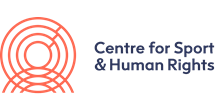[Advanced professional training] Responding to human rights abuse in sport: Safe, effective & appropriate investigation
05 - 06 March 2024- Starts at: 10:00h
- Fee: €950 (Regular fee), 600 (Student and NGO fee)
- Venue: Asser Institute
-
Address:
R.J. Schimmelpennincklaan 20-22
2517 JN The Hague
Netherlands - Register
Register now for the second edition of our advanced professional training and learn how to respond in a safe, appropriate, and effective way to cases of human rights abuse in sport.
In recent years, the world of sport has seen a rise in reports of cases of emotional, psychological, physical, and sexual abuse. Sport has often struggled to respond in a safe, effective and appropriate way to these cases. This has, at best, led to missed opportunities to improve and strengthen prevention mechanisms. At worst, it has caused retraumatisation and additional harm to those affected.
This professional training uses real life challenges from past investigations to provide insight into how (not) to respond to reports and allegations of sport-related cases of abuse. It will provide you with tools and knowledge on how to deal with abuse cases while protecting those affected, complying with human rights, and upholding the integrity of sport.
Widespread abuse in sports
The last five years have seen a huge uptick in reports of cases of emotional psychological, physical and sexual abuse in sport. All over the world, across different sports, non-recent and recent cases have come to light: abuse allegations in Dutch gymnastics and US gymnastics, the abuse of female basketball players in Mali, systematic abuse of child athletes in Japan, the abuse of young boys within the English football, or children in other grass-roots sport in Germany, the sexual abuse ofwomen’s football national teams in Afghanistan and Haiti, or the recent sexual assault against a player of the Spanish women’s national football team, to mention but a few.
Ineffective response
Responses from the relevant entities like sport organisations and governments have often fallen short of both the expectations of those impacted, and internationally recognised human rights standards. Some organisations have failed to initiate any investigation whatsoever, while others have commissioned or led inadequate responses. This has resulted in strong criticism from affected persons, their representatives, and other civil society organisations. However, until now sport has not benefited from any real clarity or consistency around good practice on how to respond in a safe, adequate and effective way to allegations of abuse. This course seeks to address that.
Good practice based on research and experience
The Centre for Sport and Human Rights (CSHR) has conducted a study, in conjunction with victims, survivors, and whistleblowers of abuse across continents and sporting disciplines, and based on the learnings developed and published a guidance on how to conduct safe, appropriate and effective investigations into abuse cases in sport. In this professional training, the Asser Institute partners with CSHR to connect practical research-based guidelines with relevant legal norms and procedures to address human rights abuses in sport.
What will you learn?
-
How (not) to respond to reports and allegations of sport-related cases of abuse
-
Knowledge and experience in responding to such cases in a way that protects the affected person from further harm and complies with human rights
- The role that investigations play in access to remedy more broadly
Speakers:
- Kat Craig (CSHR)
- Dr Daniela Heerdt (Asser Institute)
- Joanna Maranhão (4x Olympians and Survivor Network Coordinator)
- Loïc Alves (Senior Legal Counsel at FIFPRO)
- Peter Nicholson (Head of Investigations and Intelligence Athletics Integrity Unit and Ethics Officer ICC)
Terms and Conditions
Please read our terms and conditions before registration.

